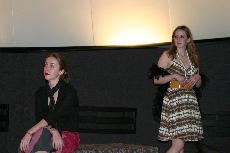“Let’s just start with the word ‘vagina.’ It sounds like an infection at best, maybe a medical instrument: ‘Hurry, Nurse, bring me the vagina.'”This was one of the many great lines of The Revelers’ production of “The Vagina Monologues,” which was performed Feb. 23-25 in Bryan Jr. Auditorium. The all-female cast performed a compelling series of monologues covering a variety of issues tied to one central theme – vaginas.
“When I first began to perform these monologues around the world, I realized that just saying the word vagina caused enormous controversy, because vagina is, in fact, the most isolated, reviled word in any language,” said Eve Ensler, writer of “The Vagina Monologues,” on the Web site www.vday.org.
As reported in The Guilfordian, the discomfort surrounding the content of the play was recently exhibited when a woman in Florida requested a local theatre to change its marquee from “The Vagina Monologues” to the more ambiguous “The Hoohaa Monologues.”
Ensler wrote the first version of “The Vagina Monologues” in 1996. Based on interviews she conducted with 200 women, the play presents topics of sexuality, love, menstruation, birth, violence, rape, and perceptions of the female anatomy.
“My hope is to add a little puzzle piece into the audience’s world view,” said senior co-director Sarah Levenson. “I feel the purpose of the play is to demystify the vagina.”
“The Vagina Monologues” also works to raise awareness about violence against women. Annual productions of the play, like the one at Guilford, raise money for V-Day, a global movement to stop abuse towards females.
The program has raised over $30 million to date. This money has gone to organizations like women’s shelters and crisis centers. Guilford’s production this year contributed $1,200 towards these causes.
Every year a new monologue is added to highlight a current issue affecting women around the world.
“This year’s theme is ‘women in conflict zones,’ and there are two brand new monologues related to this,” said junior co-director Mary Nevin Hobgood.
“Say It: For the Comfort Women,” performed by first-year Allison Martin, sophomore Kat Siladi, and assistant director of Friends Center Deborah Shaw, discusses the 200,000 Korean and Chinese women who were subjected to sexual slavery by the Japanese government during World War II.
The final monologue, “2007 Spotlight Monologue,” performed by first-year Caroline Floyd, junior Elizabeth Mehaffey, and junior Chelsea Simpson, brings up the injustice of war and how women can participate in the healing process after such destruction.
While many of the monologues touch on serious issues, several of them also use humor.
“It’s a very smart play for the way it combines comedy and social awareness,” Levenson said.
For example, “Angry Vagina,” performed by junior Kathrin Gilbert, discusses the injustices of the vagina, such as tampons and those feared visits to the gynecologist.
Also, “Woman who Loved to Make Vaginas Happy,” performed by sophomore Caitlin Allen, is told from the perspective of a sex worker who only works with other women. The monologue involves impressions of the many different types of moans and orgasms that she has become familiar with through her work.
While the monologues provoke consciousness about women’s issues, some of the audience members might have found it “a little unsettling,” as Levenson put it.
“(The play) is abrasive, but it raises awareness while also rebuilding peace and community,” Hobgood said. “It’s important to put the violence against women into context for campus. The play shows how these issues affect women, even at Guilford.”
“The Vagina Monologues” does not just educate its audience but its cast as well.
“Participating in the play becomes a social building (activity),” Levenson said. “It is a gathering of storytelling.”
The cast at Guilford consisted of a diverse group of women: they were all of different ages, races, and backgrounds. Also, the majority of the cast did not have previous theatre experience.
“The cast is diverse, and it’s a great opportunity for girls to meet each other,” Hobgood said. “Even if it’s just a performance, it represents the diversity of women on campus.”
Overall, the production exhibited the power of theatre in inspiring activism and education.
“I did not realize the full potential and viability of the theater when I began ‘The Vagina Monologues,'” Ensler said on www.vday.org. “I had certainly experienced the magic and the power before, but I had yet to understand its . ability to . empower people on the deepest political and spiritual levels.

